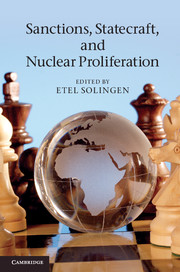Book contents
- Frontmatter
- Contents
- Figures
- Tables
- Contributors
- Preface and acknowledgments
- Part I Anatomy of inducements
- Part II Competing perspectives
- 5 An analytically eclectic approach to sanctions and nonproliferation
- 6 Threats for peace?
- Part III Reassessing the record: focused perspectives
- 7 Influencing Iran’s decisions on the nuclear program
- 8 Engaging North Korea
- 9 Contrasting causal mechanisms
- Part IV Conclusions: understanding causal mechanisms and policy implications
- References
- Index
7 - Influencing Iran’s decisions on the nuclear program
Published online by Cambridge University Press: 05 June 2012
- Frontmatter
- Contents
- Figures
- Tables
- Contributors
- Preface and acknowledgments
- Part I Anatomy of inducements
- Part II Competing perspectives
- 5 An analytically eclectic approach to sanctions and nonproliferation
- 6 Threats for peace?
- Part III Reassessing the record: focused perspectives
- 7 Influencing Iran’s decisions on the nuclear program
- 8 Engaging North Korea
- 9 Contrasting causal mechanisms
- Part IV Conclusions: understanding causal mechanisms and policy implications
- References
- Index
Summary
The Islamic Republic of Iran’s seemingly inexorable march toward nuclear weapons capability and the failure to reach an accommodation with the Iranian regime through engagement has brought the question of sanctions into sharper focus. Though a military option is still discussed as “being on the table,” an armed conflict with Iran could conceivably do more harm to US interests in the Middle East, especially given the range of US commitments in Afghanistan. An Israeli military attack on Iran could also prove to be detrimental to American interests. Hence, United Nations and US sanctions on Iran remain as perhaps the best option in pressuring the Iranian government to change its nuclear policy. These sanctions have taken the form of “smart” sanctions targeting key members of the elite, including the top echelon of the Islamic Revolutionary Guards Corps. In addition, the United States and allies have imposed broader sanctions on the Iranian energy sector, specifically targeting fuel imports, in addition to sanctions affecting shipping and the financial sector. Stronger sanctions against Iran, whether targeted or crippling, appear to have led to a substantial deterioration of the Iranian economy. Yet it is unclear if sanctions have weakened or strengthened the Iranian regime’s resolve to pursue the nuclear program.
The Islamic Republic appears to be pursuing a nuclear capability as a form of deterrence against an attack by a superior military foe such as the United States. In addition, nuclear capability may lead to greater prestige and sense of self-sufficiency for an inward-looking autocratic state isolated from the global community. Hence, much like North Korea, Iran’s nuclear program constitutes an important pillar of the regime’s survival and even political legitimacy. However, Iran, though autocratic, is much more politically and socially open than North Korea, and more susceptible to sanctions and positive inducements.
- Type
- Chapter
- Information
- Sanctions, Statecraft, and Nuclear Proliferation , pp. 211 - 231Publisher: Cambridge University PressPrint publication year: 2012
- 2
- Cited by



